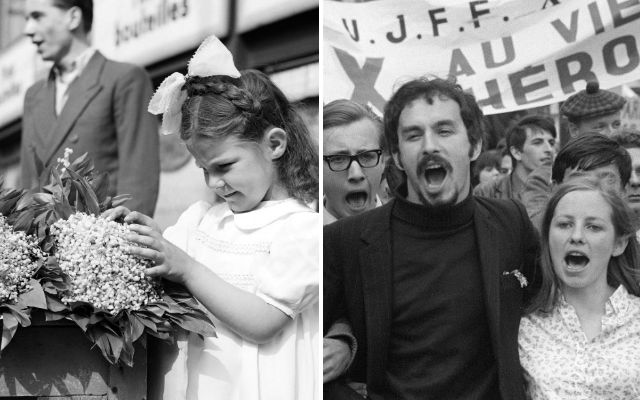First and foremost, it’s a day off work, except if it happens to fall on a weekend, in which case it’s not compensated for by a free day on the following Monday.
Unfortunately that is the case this year, when May 1st falls on a Sunday.
READ ALSO Why 2022 is a bad year for holidays in France
Marches
But there are many French who take a much more active approach to May Day, which in France is a designated day of action.
Trade unions hold traditional parades on May Day and there are frequently also demonstrations on particular issues.
Flowers
May Day isn’t all about protests and demonstrations, it’s also about flowers.
On the first of May in 1561, France’s King Charles IX was given a muguet, or lily-of-the-valley in English, as a lucky charm and liked it so much that he decided to offer them each year to the ladies of the court.
These days, the flowers are sold in bouquets on the street around France and people offer them to friends or family members for good luck.
As well as in supermarkets and florists, the flowers are often sold on the street by union activists, with funds going into the union coffers.
Far right events
France’s extreme-right party, the Rassemblement National, formerly the Front National, for decades held a May Day march from the statue of Joan of Arc at Place des Pyramides in the first arrondissement of Paris.

Femen protestors disrupted the Front National’s traditional May Day march in Paris in 2015. Photo: AFP
Current leader leader Marine Le Pen has in recent years broken with this tradition and held a “patriotic banquet” for up to 2,000 people in another part of Paris.
A tradition borrowed from the Americans
So how did May 1st become such an important day for workers’ rights in France anyway?
Surely there’s nothing more French than protests and demonstrations, but this day of action actually has its origins in a huge strike in Chicago in 1886.
On May 1st, 35,000 workers walked out of their jobs, joined by tens of thousands more in the next couple days, leading a national movement for an eight-hour work day.
Three years later, France decided to establish an “International Workers’ Day” with the same goal, but it didn’t officially become a paid day off until 1941 under the Vichy regime.
In the US and Canada, Labor Day is held on the first Monday in September.
A red triangle on the lapel
In 1890, May Day protesters started adorning their lapels with a red triangle, with the three sides representing the division of the ideal day in three equal parts: work, leisure, and sleep.
For those protesters who still wear pins on their lapels on May 1st, the triangle has since been replaced by a small bouquet of the lily of the valley flower tied with a red ribbon.
Return of les beaux jours
The May 1st holiday can actually be traced back to pagan rituals. For the Celtic people, this day marked the passage from the dark winter months to the return of les beaux jours, or the beautiful, sunny days of spring and summer.
The druids would light bonfires to symbolically protect their livestock from diseases.

May Day events hark back to pagan rituals to mark spring. Photo: AFP
In northeastern France, they called the last night of April the “night of sorcerers”. Children would patrol the villages and gardens, gathering objects that they would then place in the centre of the village, giving the sense of a supernatural intervention.
These days, the last traces of these Celtic rituals only exist in certain parts of France that still practice the tradition of the “tree of May”.
The tree of May
This rather quirky May Day tradition that has mostly fallen out of practice involves young men in some parts of France cutting down a tree during the night between the 30th of April and May 1st and then replanting it by the door of the woman they hoped to marry.
It was a sign of honour and also a celebration of the arrival of May: the month of trees, water, and nature.
Other versions of this tradition saw this May tree placed in front of a church or at the home of a newlywed couple.
Fête de la Terre
During medieval France, this time was a celebration of the season rather than ‘work’, as it was to become. It was named “Fête de la Terre”.
A feast would be hosted for three days in celebration, during which time musical parades would take place with people dancing and riding mules adorned with ribbons through the villages, to an enormous banquet.
This tradition is best preserved in rural areas of France, such as the mountainous department of Isère, or the south west region of Cahors, where the weekend surrounding the 1st is usually one of celebration, using it as an excuse to come together and enjoy the good weather, with parades and markets of regional products.



 Please whitelist us to continue reading.
Please whitelist us to continue reading.
Member comments